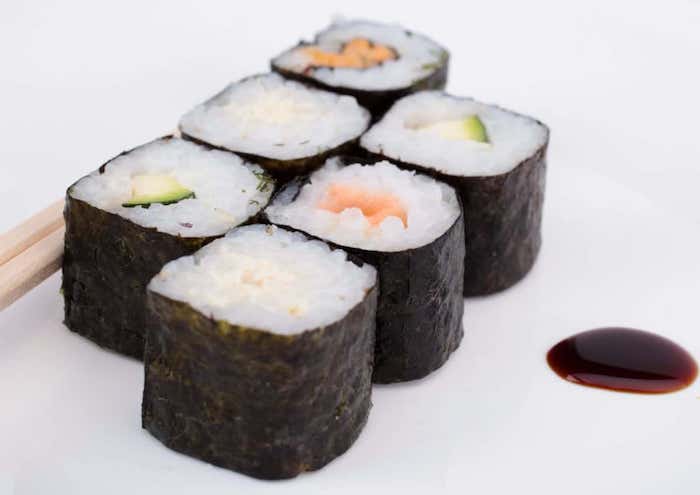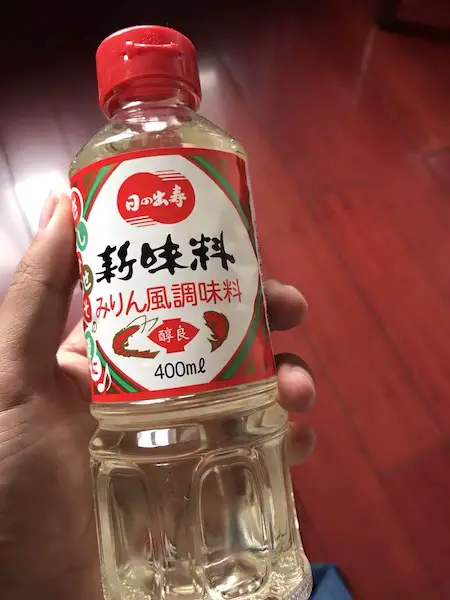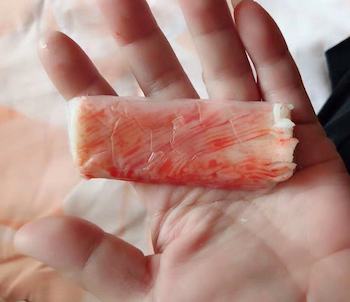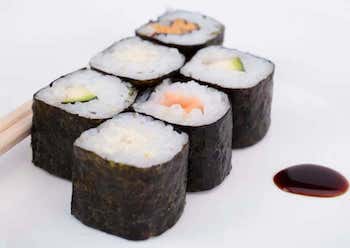We are reader supported. When you purchase through links on our site, we may earn an affiliate commission. Also, as an Amazon affiliate, we earn from qualifying purchases.

If you are a Muslim traveling to Japan or simply you wish to know whether you can eat sushi without going against your religion, you have come to the right place. As sushi may contain raw fish, seafood, and meat of different varieties, it is important to know what you are eating.
Is Sushi Halal or Haram? I looked up for an answer and found that it can be both a Yes and No. Any type of fish or seafood that has fins and scales on its body is considered to be halal as per Sunni Hanafi school of thought. However, shrimps, prawns, lobsters, crabs, octopus, eel and the like that do not have fins or scales are considered as haram or prohibited for the Muslims.
Besides fish and seafood, mirin is a popular Japanese condiment that may contain low to high alcoholic content. The rice vinegar used to season sushi rice may sometimes contain some percentage of mirin. As alcohol is haram in Islam, you must ask the sushi chef if he has used mirin to season the sushi rice.
While meat is less commonly used in sushi, some restaurants may use chicken, pork, and other types of raw or cooked meat as fillings in sushi. Pork is considered haram in Islam. Other types of meat can be consumed if the animal was slaughtered as per Islamic law.
Contents
Is Raw Fish Considered As Halal?
Most Islamic scholars and experts in the field are of the view that raw fish is permissible as it contains very little blood, and has fins and scales. Most of the internal organs in a fish are located in the head part. Once the head is cut off, the fins and gills are removed and cleaned properly, it should be considered as Halal.
The head is the most important part that may contain blood that has impurities in it. So, if the head is dissected and all internal organs are removed and cleaned, there should not be any issues. The small fish have a negligible amount of blood but even then, it is best to remove the head and clean all impurities.
Is Seafood Halal Or Haram?
Interestingly, different Islamic groups may have different views regarding seafood and whether it should be considered as halal or haram. The widely accepted opinion is that all seafood is not halal and there are some that say it should not be consumed.
The carnivore fish such as shark is considered as haram. The whale is haram too. Fish that do not contain any scales (eel for example) and lobsters are considered as haram for the Shiite community.
As per the Shia Islamic law, only the fish that have scales and shrimp are considered as Halal. All other types of seafood are haram.
There is a small group of scholars belonging to Shia Islam who believe that all types of seafood is permissible provided that it is killed outside water.
According to the Sunni Islamic community (Hanafi branch), all types of fish with the exception of squid are considered as Halal.
As per the Sunni Islamic community (Shafi’i branch), there are four different views regarding seafood being halal or haram:
• First, same as the Hanafi rule mentioned above.
• Second, all aquatic animals are halal except frog, crocodile, pinniped, and turtle
• Third, all aquatic animals are halal except the frog
• Fourth, all aquatic animals except the ones with a haram terrestrial counterpart are considered as Halal. For example, a horse is halal or seahorse is also haram. The dog is haram so beaver is also haram.
What Is Mirin?

This is a popular Japanese condiment used for seasoning a variety of dishes to enhance the flavor. It contains rice vinegar, which may be similar to sake but contains considerably low alcoholic and high sugar content. Check on Amazon
Although no sugar is added to mirin, the fermentation process results in forming complex carbohydrates that lend a sweet taste to the condiment. If mirin is heated, the alcohol content can be lowered significantly but it still remains.
There are three popular types of mirin used in Japanese cuisine:
Hon mirin is the real mirin that contains about 14 percent of alcoholic content. It is produced by a process of 40-60 day mashing.
Shio mirin is the second type and it is known to contain low alcoholic content (only about 1.5 percent) to avoid tax.
Shin mirin, also known as new mirin is the third type and it contains less than 1 percent of alcohol. Despite of being extremely low in alcohol, it still retains the flavor.
Thus, you can see that all forms of mirin contain low to high amounts of alcohol, hence it is considered as haram. You must ask the sushi chef if he has used mirin in sushi rice. If possible, request him to prepare sushi rice without mirin for you.
What Are The Other Uses Of Mirin?
The sushi chef may sometimes add mirin to grilled fish to get rid of the fishy smell. Sometimes the chef may add a little mirin to soy sauce instead of adding sugar, however, it should not be in an excess amount. Mirin may also be used in preparing the teriyaki sauce.
What Can You Use As A Substitute For Mirin?
As mirin contains alcoholic content, you must look for substitutes that do not have any alcohol in it. Rice vinegar is a good substitute and it is widely used for seasoning sushi rice. This mild to mellow vinegar may range in color from colorless to pale yellow. You can add sugar and salt in rice vinegar to prepare the dressing for sushi rice. It can also be used for dressing salads.
Can Soy Sauce Contain Alcohol?
The soy sauce is an important part of sushi eating and it is served in almost every sushi restaurant around the world. Dipping the sushi pieces in soy sauce is believed to enhance the flavor and improve the taste in manifolds.
However, if you are wondering whether sushi is halal or haram, it is also important to consider the sauces and condiments that come with it. Soy sauce, for example, is a naturally brewed product like beer or wine.
The soy sauce comes from soybeans, mixed with wheat, salt, and water. At the time of fermentation, the wheat starches are broken down into sugars that are then changed to alcohol. While the alcohol helps in adding to the overall aroma of the sauce, the food becomes haram in nature.
You may ask for your sushi chef for substitutes for soy sauce or request him to not add or serve soy sauce with your food.
Can You Find Halal Restaurants In Japan?
Although Japan has a small percentage of the Muslim population, the number of Muslim tourists are rising rapidly. Although the country is tolerant towards different religions including Islam, there is a lack of adequate understanding and services designed especially for Muslim travelers.
Off late, there has been a rise in Muslim-friendly services such as halal food options, prayer rooms, etc making it easier for Muslims to travel in the country. However, the absence of any established halal certification agency, the restaurants have to figure out things on their own. This makes it difficult to maintain a standard for halal foods.
In recent times, a few reputed halal food producers and halal restaurants serve halal sushi in Japan. The chefs are friendly and eager to accommodate the needs of their guest so if you are concerned about alcoholic content in your sushi or you are unsure about the type of fish used, talk to the chef.
Some restaurants label themselves as Muslim-friendly or halal but they may serve alcohol because it is difficult to run a restaurant without serving wine or beer. They usually have a halal menu option alongside a regular menu.
What Is Your Best Option
If you love eating sushi but are worried about it being halal or haram, I would recommend that you make your own sushi at home. The best thing about this scrumptious dish is that you can change it to adapt to your varied tastes and needs.
To make sushi rice at home, you can shop for vinegar that does not contain any alcoholic content. You can also buy halal sushi-grade fish from a trusted fishmonger. Thus, making your own sushi at home is a safer option if you don’t want to err out of ignorance.
Related Questions
Is Imitation Crab Meat Halal Or Haram?

The imitation crab meat is made of different types of flesh pulverized together hence it may contain flesh of seafood that is considered haram. However, there are some production companies that prepare surimi in a controlled manner to ensure that only halal animals go into production.
What Is Halal Mean?
Halal is Arabic term which means permissible. The food is considered as halal if it adheres to the rules laid down in the Islamic law. In Islam, there is a defined method for slaughtering animals or poultry and this includes cutting the jugular vein first

